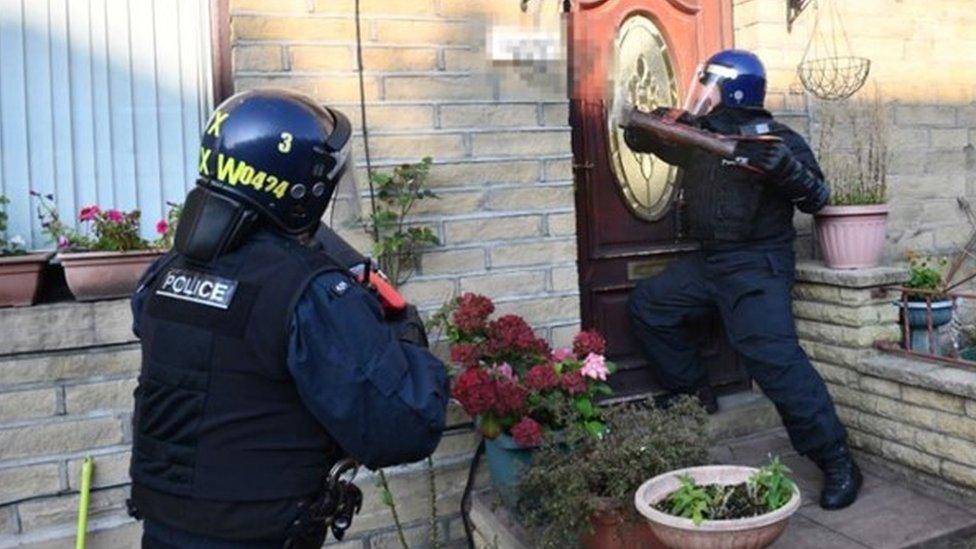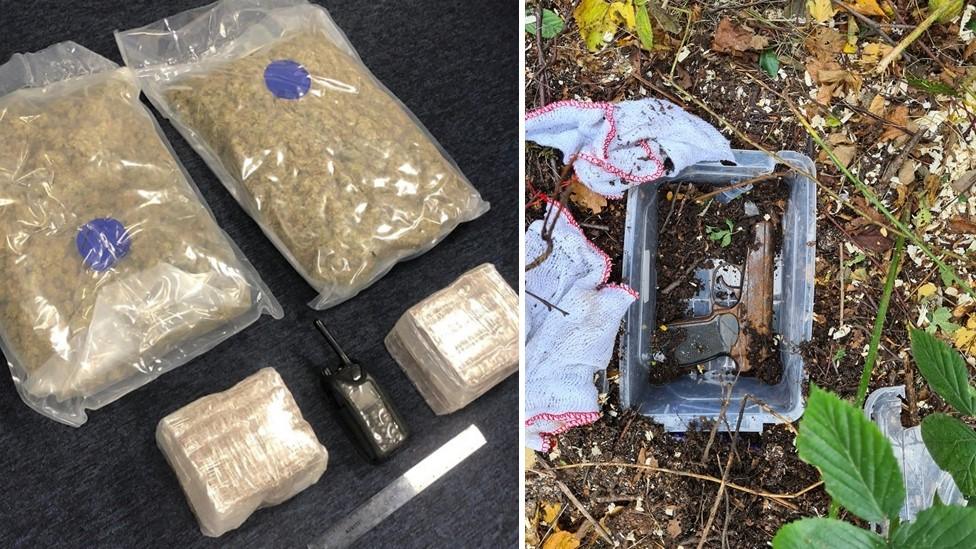County lines raids: 1,000 arrests and £1.2m drugs seized
- Published

Police said all 43 regional forces in England and Wales were involved in the raids
More than 1,000 people have been arrested and an estimated £1.2m worth of drugs seized in a police crackdown on so-called "county lines" gangs.
Young and vulnerable people are used as couriers to move drugs and cash between cities and smaller towns.
Police said raids in the past week, involving all 43 regional forces in England and Wales, had been the most successful of their kind.
Almost 200 weapons and £526,000 in cash were also seized.
During a week-long operation, police forces also shut down about 10% of the phone lines (102) being used for drug dealing.
County lines is the term used to describe criminal gangs who move illegal drugs from big cities to more rural locations and sell them via dedicated mobile phone lines.
It is a "business model" which now dominates the drug trade, according to BBC home affairs correspondent Tom Symonds.
Investigators said restrictions imposed during the Covid-19 pandemic and a better understanding of mobile phone data had helped them target the drug dealers operating the lines.
'Spot the dealer'
Nikki Holland, director of investigations with the National Crime Agency, told BBC Radio 4's Today programme: "Drugs dealers were a lot more visible on empty trains and on roads that are less busy so it was much easier to be able to spot the drugs dealers."
She added the police forces had worked with phone companies to share intelligence with each other and now had a "greater understanding" of how phone lines are used when they are passed on from one group to another.
By liaising with law enforcement overseas the NCA had been able to "choke the supply" of drugs, she said.

Class A drugs, £526,000 in cash and almost 200 weapons were seized
The operation resulted in:
1,041 arrests
The discovery of an estimated £876,000 worth of cocaine, £87,000 worth of crack cocaine and £234,000 worth of heroin
Seizure of £526,000 of cash
Confiscation of 196 weapons including 130 knives, 18 firearms, 5 samurai swords and 10 knuckledusters
102 "deal line" devices, linked to phone numbers used to buy drugs, were shut down
1,551 vulnerable people were contacted by police for safeguarding purposes
69 referrals to the National Referral Mechanism as potential victims of human trafficking/modern slavery
Visits to 861 cuckooed addresses - a practice where drugs gangs take over the homes of vulnerable people to sell drugs
Key to the county lines trade are mobile phone numbers advertised in smaller towns but controlled by gang leaders in cities like London, Birmingham and Liverpool.
The gangs send bulk text messages to customers informing them of what is on offer, with cocaine and heroin the most common drugs for sale.
Gangs then have to transport the drugs to the areas where they are sold, often using young or vulnerable people, who are enticed or threatened into being involved.
The phones used are usually pay-as-you-go, but police are obtaining communications data from network providers and analysing the calls and texts sent and received to work out who controls the line.
The evidence is so strong, defendants often plead guilty without going to trial, police said.
'They are made to work in horrific circumstances'
Metropolitan Police Deputy Assistant Commissioner Graham McNulty, the National Police Chiefs' Council (NPCC) lead for county lines, said: "We know now what a county lines phone looks like."
Home Secretary Priti Patel said the results of the operation were "hugely impressive" and tackling county lines was a "priority" for the government.
She said it had invested £25m in the "crucial work".

Why not follow BBC North West on Facebook, external, Twitter, external and Instagram, external? You can also send story ideas to northwest.newsonline@bbc.co.uk, external